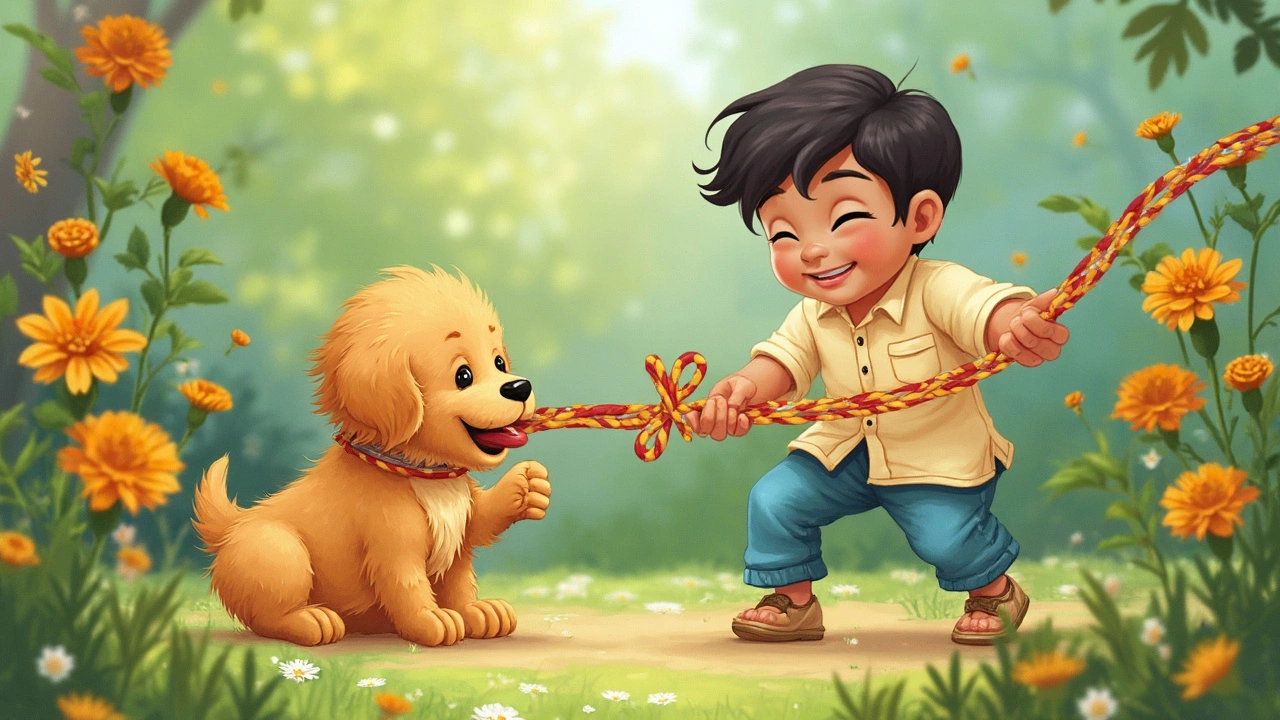
Got an 8-week-old puppy on your hands? You're probably wondering if toys are essential for them at this age. The short answer is: absolutely! Puppies are like tiny balls of energy and curiosity, needing more than just food and naps to thrive. Toys aren't just about fun—they're essential for your pup's development.
Think of toys as tools that help with teething, mental stimulation, and preventing those oh-so-destructive habits you want to avoid. Imagine your puppy chewing the couch leg instead of a chew toy. Not a pretty sight, right?
It's crucial to choose the right toys for your little furball. Look for toys designed specifically for young puppies. These are typically softer yet durable enough to withstand their biting. You'll want something engaging yet safe—avoid toys with small parts they could swallow.
But it's not just about picking the right toy; it’s about knowing how to use them effectively to engage your pup. Toys can be a fantastic way to bond and train your puppy, setting the foundation for a well-adjusted adult dog.
- Why Puppies Need Toys
- Choosing the Right Toys
- Safety Tips for Puppy Toys
- Engaging Your Puppy with Toys
Why Puppies Need Toys
Alright, so you've got this adorable ball of fluff and you're probably thinking, why does my little 8-week-old puppy need toys? Well, there's quite a bit going on in those tiny heads and toys play a crucial role in their development.
Teething Relief and Dental Health
Puppies start teething around 3 weeks and it can go on until they're about 8 months old. During this time, their gums feel itchy and a bit sore, so they have this overwhelming urge to chew on things. Giving them the right puppy toys can save your shoes and furniture from becoming casualties in their quest for relief. Look for chew toys that are soft yet durable, providing comfort to their sore gums.
Mental Stimulation and Physical Exercise
Puppies have endless energy and a thirst for discovery. Toys that engage them mentally and physically are vital. They help keep boredom at bay, which is crucial because a bored puppy can easily become a destructive one. Interactive toys, like puzzle feeders, can help keep their minds sharp and their bodies active.
Developing Social Skills
Believe it or not, toys can be a social tool too. By playing with your pup using toys, you're teaching them how to interact with humans and other dogs. This playtime is more than just fun—it's building the foundation for your pup's social skills. And let's face it, who doesn't want a well-behaved dog that gets along with others?
Bonding with Your Puppy
Toys can be a great way to strengthen the bond between you and your puppy. Engaging in play, whether it's a game of fetch or tug-of-war, helps build trust and makes your puppy see you as a fun, reliable companion. This bonding time is essential for a happy, healthy puppy life.
So, as you can see, toys are more than just fun distractions. They play a fundamental role in your puppy's growth and well-being. Next time you're in the pet store, remember that picking the right toys for your 8-week-old puppy is investing in their future.
Choosing the Right Toys
Picking the perfect puppy toys for your 8-week-old bundle of joy can feel overwhelming with all the options out there. But don't worry—I've got you covered with some handy tips that will make the shopping experience a breeze.
Consider Their Size and Breed
First things first, size matters. Your pup's toy should be small enough for them to handle, but not so small they could accidentally swallow it. If you've got a tiny breed on your hands, keep an eye out for toys made for smaller mouths.
Material Matters
Next up, think about the materials. You want something that's strong enough to withstand a bit of chewing madness, but also soft enough for their little puppy teeth. Look for toys made of rubber or soft plastic—two top choices that strike a good balance. Avoid toys with stuffing that can get torn apart in seconds.
Interactive and Engaging
Puppies love a good mental challenge, so opt for toys that engage their brains. Puzzle toys or treat-dispensing toys can keep them occupied for ages, giving their brain a workout while you get a nice break.
Teething Solutions
Teething can be a tough time, so choose toys that help soothe those itchy gums. Chew toys designed for teething puppies, often made with softer rubber and ridged surfaces, are perfect for relieving discomfort and keeping your pup happy.
Avoiding Hazards
Okay, we have to talk safety here. Steer clear of any toys with small parts or toxic materials that could pose a risk. Remember, supervision is key—especially with any new toy. If it shows signs of wear or breaks apart, it's time to toss it.
By following these guidelines, you'll be well on your way to finding the ideal puppy toy for your furry friend. With the right toys, you'll be supporting their growth, ensuring they're safe, and keeping them thoroughly entertained.

Safety Tips for Puppy Toys
When it comes to puppy toys, safety is a top priority. You don't want your adorable 8-week-old risking injury or swallowing something they shouldn't. Here's what you need to know to keep playtime both fun and safe.
Pick the Right Size and Material
Starting with the basics, always choose toys that are the appropriate size for your puppy. Toys that are too small can be choking hazards, while oversized ones can be tough to handle for those tiny paws. Look for toys made with non-toxic materials that can handle some serious chewing. Rubber or fabric toys are often a safe choice.
Avoid Toys with Small Parts
Squeakers, bells, or any small attachments might seem fun, but they can pose a significant risk. Puppies are curious and might dislodge these parts, which can then become a choking hazard. Stick to toys without small, removable pieces or parts that could easily break off.
Regular Inspections
Your pup's favorite toy can wear out over time. Regularly examine toys for wear and tear. Check seams, stuffing, and whether any parts have become brittle or loose. If a toy looks like it's seen better days, don't hesitate to replace it with a new one.
Provide Supervised Playtime
While it's tempting to toss a toy to your pup and let them go wild, supervised play ensures they use the toy properly and don't hurt themselves in the process. This is especially important for newer toys or ones they haven't played with much before. Supervision can help prevent accidents and give you peace of mind.
Remember, a bit of precaution goes a long way in ensuring happy, healthy play sessions for your 8-week-old puppies and their beloved puppy toys.
Engaging Your Puppy with Toys
Getting an 8-week-old puppy to play with toys might seem like a piece of cake, but there's more to it than just tossing a toy and hoping they catch on. It's all about making the playtime interactive and beneficial. Puppies, just like children, are spirited and curious. They need guided play to develop both physically and mentally.
Start with Simple Games
An easy way to get your puppy hooked is through simple games like fetch or tug-of-war. Start with a light and soft toy that's easy for them to grab and carry. To play fetch, gently throw the toy a short distance. When they chase and bring it back, shower them with praise. It taps into their natural instincts and helps you bond.
Rotate Their Toys
Variety is crucial. Just like us, puppies can get bored with the same old toys. Keep things fresh by rotating their toys every few days. This technique not only keeps your puppy engaged but also prolongs the life of each toy. When an old favorite comes back into the rotation, it feels like a new toy all over again!
Interactive Toys and Puzzles
Engage your puppy's mind with interactive toys and puzzles. These toys often hide treats and require puppies to figure out how to access them. They provide mental stimulation and can keep your puppy occupied for a while. Plus, they're a fantastic way to tire them out without needing constant attention.
Use Toys for Training
Incorporate toys into training sessions. Many puppies are food motivated, but toys can be used as rewards too. Teach them commands like 'drop it' or 'fetch' using their favorite toy. Not only are you teaching obedience, but you're also making the process enjoyable.
Keep an Eye on Play
While it's tempting to let your puppy play independently, supervision ensures safety. Keep an eye out for any small parts or pieces that could be chewed off and swallowed. It's also a good idea to regularly check their toy collection and remove any damaged ones to prevent accidents.
With these tips, you'll have your 8-week-old puppy loving their toys and learning through play. A happy, stimulated puppy is more likely to grow into a well-adjusted dog. So, grab those toys and get playing!
